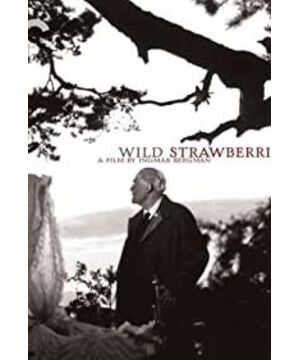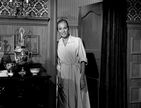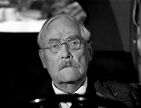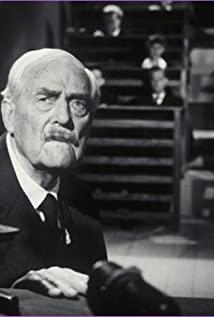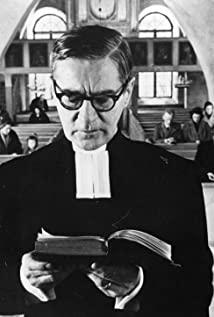1
The 91-minute "Wild Strawberry" (1957), which is pulled almost every year, is probably the film I've seen the most, but I haven't written much about it. Because she has earned Bergman the most famous name, it has left me feeling stuck and unable to start. Indeed, the more familiar a movie is, the more apprehensive it is to be able to get to the point. For the old man in the film, it was a meaningful short trip.
In life, there is always a comparison between gains and losses, and it seems that reputation trumps everything. This is not a simple sentence of vanity to understand, and vanity does stimulate people's imagination and fighting spirit in a certain state. But it is ultimately weak and powerless, and unsustainable. Therefore, the old man in the film's emphasis on reputation is actually just a gimmick. The director just wanted to go through this trip and find the right medicine to see how he healed and how he was hurt by reality.
2
Bergman said of the film: "The impetus that drove me to make 'Wild Strawberry' came from my strong desire to try to express my strong desire to my parents who abandoned me, who at the time were transcendent and mythical, And that attempt was doomed to fail. Years later, they were transformed into normal human beings, and the resentment I had since childhood faded away. Only then can we live in harmony and understand each other.”
Bergman, like many directors, is afraid to watch his own films again, and always avoids re-reviewing his old works: "Every time I have to re-watch, or I am driven by some kind of curiosity to re-watch an old film, no matter what Which movie, without exception, always feels uncomfortable, always has to go to the bathroom desperately, feels anxious, wants to cry, is angry, fearful, unhappy, nostalgic, sentimental, etc.” These few paragraphs are helpful. Because we understand the director's true thoughts on the shooting of this film.
The director also said that the actor Huestrom who played the old man was good at telling stories, interesting and charming: "What I still can't figure out is that Huestrom can take my words, transform them into his own, add his own experience, pain, sadness, cruelty, escape, grief, fear, loneliness, coldness, tenderness, severity and powerlessness. Wild Strawberries is no longer my film, but Hueststrom’s.” Of course, here There is the director's self-effacing meaning.
3
I often wonder, what did the popular "Wild Strawberry" bring us?
This is a difficult question to answer. Not a good one to explain. Everyone has memories, everyone has dreams, and everyone has unbearable reality, but not everyone is as entangled as the people in the film, and they are presented in that 14-hour itinerary. Bergman's Gog, depending on his choices and layouts, is like a long poem, how exquisitely stated, and how it can always control the rhythm without breaking the chain. This is due to Hustram's precise grasp, which is also the reason why Bergman praised Hustram.
Victor Huesttrom, who has been a director himself, is of a similar age as the character and is in the same mood. It's no surprise that he played the character so brilliantly. Even if it is said that he is performing himself, there is also a problem of degree. He has the same pain and past as Isaac, and he plays it well. Even us viewers will forget his role and assume he is himself. This feeling benefits from Bergman's scheduling and laying. This is a mutually beneficial hand in hand.
4
The film uses the male protagonist's voiceover as a reminder, which is roughly composed of three parts: dream, nostalgia and reality. For a 78-year-old Isaac (Victor Huestrom), these three parts of the situation constitute the main scene of his life in the waning years. The old man has been a doctor for half a century, and he can be described as a famous doctor in Stockholm. His wife had been dead for many years, and there was a maid, Igda, who was almost as old as him. In her eyes, the old man was a selfish and eccentric guy. Of course, the old man would retort her with an old trick. This maid, who has been with him for 40 years, looks like family.
It stands to reason that for people of this age, most of them have nothing to think about. But for the sake of fame, the old man will go to Long Gao's alma mater to receive the honorary degree award ceremony. This is simply an irony. A dying person, who values this kind of vain reputation so much, can be described as a critically ill patient of the "intellectual disease". But he was awakened by a nightmare. On the lonely street, he encountered a standing zombie, and then encountered a carriage pulling a pair of coffins. The carriage hit the street lamp and rolled over. The coffin cracked, and a hand stretched out from one of the coffins. When he looked closer, it turned out that the other person was trying to pull him, causing him to wake up.
5
This nightmare shot, very close to a scene in Buñuel's "An Andalusian Dog" or "The Golden Age", has a surreal overtone. Because of this nightmare, he wanted to stop by the old house to see on the way to his alma mater. During his conversation with the old maid, his daughter-in-law (Gerry Tulin) smiles. We thought it was just these two old men in the house. Interestingly, his daughter-in-law called him Uncle Isaac. Then we wonder, where is his son. The daughter-in-law is willing to go to school with the old man. In the car, she said: "Uncle Isaac, you always pretend to be old-fashioned politeness, and under your exterior you are as hard as iron, when I tell you about my relationship with Ewald. , you said don't involve me in your marriage."
It can be seen that the daughter-in-law is dissatisfied with the old man. A cold-hearted person who looks kind but is different from ordinary people. At least, he could still listen to what his daughter-in-law had to say. Stopping on the way, the old man pointed to an old house in the woods, where I lived before I was 20 years old. That's where he grew up. When he came to the former garden, he seemed to see his cousin Sarah (Bee Anderson) picking wild strawberries alone. That tranquility was immediately interrupted by the intruding brother Sigfrid. He also pursued Sarah, but Sarah fell in love with Isaac, only because he was aloof, inarticulate, and clumsy in showing love, and eventually she had to marry the more lively Sigfrid. Sarah, now 73, is still alive. But the film does not show her old appearance from beginning to end, but only repeatedly shows her young appearance. This can be regarded as the most beautiful and most regrettable situation in the life of the old man.
6
For the memories here, it also involves the joy of a noisy family, but these no longer exist, and all good things will eventually fade away. Just as the old man returned, a girl named Sarah appeared in reality. She was also played by Bibi Anderson, but her hair was cut short and her character was more lively, like a tomboy. She was accompanied by two boys Ender. and Victor. They are going to Italy. In this way, they traveled together in Isaac's car. It's an interesting scene, as if Sarah in the old man's heart was resurrected before his eyes in another way. Sara hugged from left to right, worrying about which one to choose as her boyfriend, which was exactly the same as what the old man remembered Sarah when she was young.
This second stop was a complete accident. Life is always full of surprises. In a trance, the old man, who had not come back from the old house, was suddenly scared by the oncoming car and almost rolled over. Fortunately, everyone was safe. This is a rowdy couple whose relationship is at its worst. The chattering man was named Sten, and his wife Elman had been ridiculed by him all the time, so much so that on the way, his daughter-in-law couldn't stand his quacks and drove them out of the car. The couples under Bergman's lens are always in a cramped space, where the cold war and the hot war intersect. Married life can be a hopeless torture for Bergman.
7
They came to the home of Isaac's 96-year-old mother. Coincidentally, they did not visit the old lady first, but let Isaac dine by the lake with the three young people, having the rarest leisure time in reality. What I like the most is this part. Thinking about it, sitting by the lake in the misty rain is not only full of ancient meaning, but also has a bright color under the heavy tones. The old man was so excited that he sang a poem: "At dawn, the friend I am looking for, where are you? When the night falls, it is hard to find its trace. I am anxious to find its trace. Where the flowers bloom, I see the trace. , true love pervades, its voice is audible, and the summer breeze is cool." The daughter-in-law and the young man Victor recited. The old man seemed to have returned to his passionate youth. This episode is more like a real fantasy in reality.
When Isaac brought his daughter-in-law to visit the old mother in the house, the mother, who was still eccentric, actually reprimanded her granddaughter-in-law as her daughter-in-law, which also paved the way for the old man's dream behind him, and let us know why the old woman hated her daughter-in-law so much. When the old lady opened the treasure chest, all of them were Isaac's childhood toys, letters, and pocket watches that his father used. These objects with the past are just useless things that have stagnated under time, and they must also be memories of the old lady's usual life. keepsake. But the old man had to say goodbye and move on. Next, the old man and his daughter-in-law came to his son Ewald. The son and daughter-in-law were unhappy because of the dispute, and they did not contact each other for a while.
8
The cause of the incident is that the son does not want children, but the daughter-in-law does. The son said that he has lived in the shadow of his parents' failed marriage since he was a child. He doesn't want to be forced to take on more unnecessary responsibilities for the next generation. This is indeed a problem for my daughter-in-law. In this way, the son's hatred for his father has a long history, and it is only natural that he neglects to visit and greet him. Is there any kind of interpersonal relationship that is cheerful and smooth under Bergman's lens, almost none. The most beautiful scenes exist only in the past of the passing years. It can be said that this is the syndrome of modern civilization, so this movie is prophetic. Look at the current world, how serious this syndrome of modern civilization is.
The dream did not stop. Before entering the university, the old man dozed off and dreamed that Sten, the man who was quarreling with the husband and wife in front of him, announced his verdict on the crime of dereliction of duty as a judge. This is mainly for his neglect of his usual care for his wife. Stern takes him to a wood where he sees Isaac's wife having an affair with a man. Afterwards, she complained that her husband neglected to care for her, and it was not uncommon for him to claim to forgive her wrongs. This just shows that the relationship between husband and wife is on the verge of collapse, so that the wife has to find an emotional outlet. This is the most painful memory of the old man's life, although his wife has been dead for many years. There is self-blame and hatred, and even more confusion and swelling.
9
With such a sad past, I participated in the school's honor presentation ceremony, and I can imagine what kind of mood it is. After the ceremony, the real Sarah and the two guys said goodbye to him. Sarah said we will go to Hamburg, we love you, today, tomorrow and forever. This gave him great comfort. Sara in memory and Sara in reality, overlapping together, are just a bunch of flowers, a shadow, or a continuation of another beautiful way, but this is destined to pass in a hurry, not leaving a trace trace. The two Sarahs entrusted the director with an expectation and bright color that still exists in the real world. The regret of the past can be filled by reality. But I always feel that this is just a good wish, not a real reality.
The old man who returned to his home in Stockholm came home with a tired face, still haunted by nightmares. An old man who was seriously suffering from "intellectual disease" could not change the indecent dictionaries of "selfishness, ruthlessness, arrogance", and the rest , there is only disappointment under the separation of reality. For the care of the old maid, the shy Isaac fell asleep. It is impossible for him to spend his life with the old maid, which is why he is arrogant and why she complains so much. You have to suffer for face and face, isn't it better to have someone to sleep with and comfort you, you can live for a few more years.
He would rather dwell on the memories of the past, thinking of Sarah continuing to pick strawberries. Sarayan said with a smile, our family will set sail to another island for vacation. "Where the flowers bloom, I see their traces." For the old man, what a dull twilight scene, no matter how beautiful it is, it will never happen again. Our life, whether good or bad, will eventually lose its due kinetic energy because of our obsession and because of the rush of time.
10
In my opinion, the demanding of the old man is not from the director's original intention. Bergman is just showing, not blindly blaming the old man. The life situation of most intellectuals is probably almost the same. They are workaholics, have great achievements, but can't live their lives well, and even leave a lot of regrets. When I thought the voiceover was superfluous, I gradually realized that it was part of the poetry of the film. An old man's murmurings, a deep self-blame memory, for a man who is about to be eighty, can not help but cruel. Because of human indifference and inadvertent negligence, the beauty that should not have been lost is often lost. Just as movies are the art of regret, so is life.
But the film still makes me feel superficially rushed, not delving into the old man's unbearable past, but passing it lightly through dreams and recollections like a poem. Maybe the director doesn't want to tangle, that could be endless. The old man walked in the woods to the stroller that Sarah was feeding, and everything was empty. Then he quietly walked to the front of the house and saw the sweet life of Sarah and her husband. It is precisely because of this loss that he neglected his wife, so that his wife had to find emotional solace through cheating. That's why he asked his wife for forgiveness.
11
Strawberry itself is a delicious and beautiful thing, and it is more appropriate to imply youthful youth. To put it simply, this is an old man reminiscing about the past, with a bit of reality mixed in by the way.
This is actually a road movie, which is of course different from the two sisters on the train in "Silence", which is a nerve-racking journey in a cramped space. If I have to be picky, I think "Wild Strawberry" still lacks coherent highlights in the fineness of the front and rear. In reality, the appearance of Sarah is also a bit of a strong feeling. The point is, the poetry in it is a lot less chewy.
The mirror language of the film's modernity is still in the director's exploration period. Only after the "Silence Trilogy" can the modernity of the director's film be truly established. Of course, this perception may be related to the fact that I have pulled it a dozen times, and I always feel that the taste is a little lighter. But that doesn't hide her gloomy glow. She is still an irreplaceable timeless classic in my heart. "Where the flowers bloom, I see their traces." Yes, grass and trees have a lifetime, everything is related to haste, life is so fleeting and never comes again.
2018.7.14
View more about Wild Strawberries reviews


